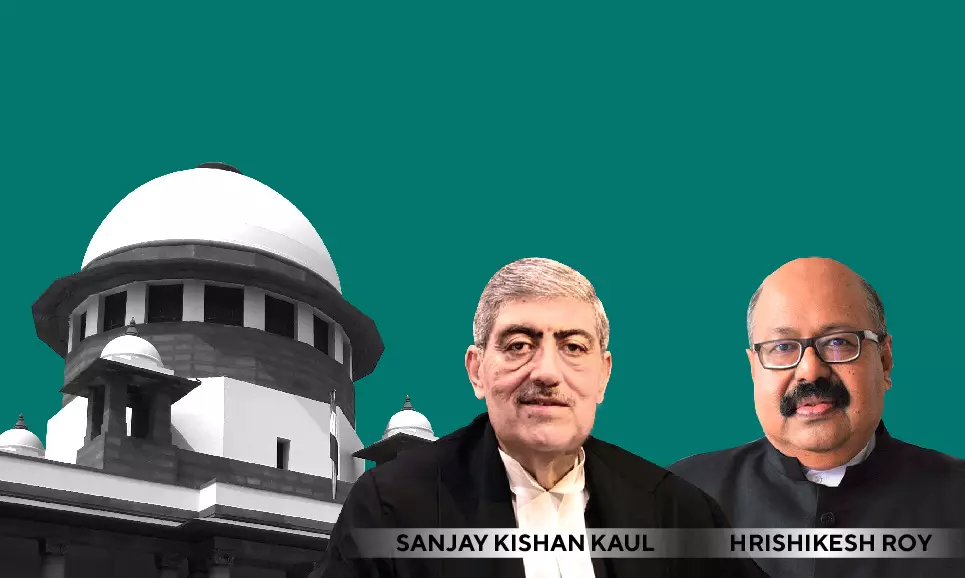
Genuineness Of A Deed Cannot Be Questioned For Affixation Of Thumb Impression Instead Of Signature: Supreme Court
 |
|Supreme Court has held that the genuineness of a Cancellation Deed revoking a Will cannot be doubted merely because the Testator chose to affix a thumb impression instead of signing it.
A two-judge Bench of the Supreme Court has held in the case of Lachhmi Narain Singh (D) v. Sarjug Singh that the authenticity of the cancellation deed cannot be questioned merely because a literate person has affixed his thumb impression instead of signing the document.
The Court further held, "The key characteristic of thumb impression is that every person has a unique thumb impression. Forgery of thumb impressions is nearly impossible. Therefore, adverse conclusion should not be drawn for affixing thumb impression instead of signing documents of property transaction."
The Court was considering an appeal filed against the Judgment of the Patna High Court which gave its ruling in favor of the probate applicant and held that the Will was not cancelled by the Testator. In doing so, the Patna High Court reversed the Trial Court's finding that the probate applicant is not entitled to get the Will probated as it was revoked by a registered cancellation deed.
Facts of the case
On September 14, 1960, the Testator executed a Will in favor of the probate applicant and the Testator died issueless in 1963. The probate proceedings were objected to by the second wife and widow of the Testator. The widow of the late son of the late brother of the Testator also opposed the probate application. According to the objectors, the will was revoked and cancelled by a registered deed dated February 2, 1963.
The Trial Court held that the Will has been revoked by a valid cancellation deed. Before the High Court, the probate applicant questioned the originality of the thumb impression on the cancellation deed, asserting that the Testator was a literate person who would rather have signed the document. He also claimed that the Testator was seriously ill, paralytic and could not have gone to the sub-registrar's office to register the cancellation deed.
The High Court, taking into consideration the declining the health of the Testator and the inability of the objectors to produce the original cancellation deed and any productive witness, held that the deed cancelling the Will must not be relied upon, hence granting probate.
Supreme Court's findings
The Supreme Court addressed the following two issues: -
- Whether the Testator had actually revoked the Will and whether he had the physical and mental capacity to execute the Cancellation Deed.
- Whether the thumb impression of the Testator on the registered cancellation deed was genuine or not.
While answering the above-mentioned issues, the SC held that the High Court had failed to give weightage to the material evidence produced before it. Instead, an erroneous presumption was drawn on impersonation and incapability of the testator, to visit the office of the Sub Registrar to register the Cancellation Deed.
The Court further held that the probate applicant never objected to the acceptance and marking of the cancellation deed in the trial Court.
"Therefore, in the face of the Expert's Report, when the Deed of Cancellation were marked without any objection before the trial Court, those cannot be treated as inadmissible and should have been accepted as genuine, particularly in view of the testimony of OW3, OW4 and OW5, who stood firm on execution of the registered revocation deed by the testator, Rajendra Singh," the Court said.
After referring to various previous Judgments, the Court held that a plea regarding mode of proof cannot be permitted to be taken at the appellate stage for the first time, if not raised before the trial Court at the appropriate stage. This, the Court held, is to avoid prejudice to the party who produced the certified copy of an original document without protest by the other side, who would have produced the original, had there been a timely objection.
Also, addressing the issue regarding the thumb impression, the Court asserted that all the four deeds executed by the Testator during his lifetime contained his thumb impression and not signatures. Hence the conflicting assumption on the genuineness of the cancellation deed cannot be made just because a literate person chose to affix his thumb impression and not signature on the document.
The Supreme Court set aside the Judgment of the High Court and upheld the Judgment of the Trial Court refusing probate.